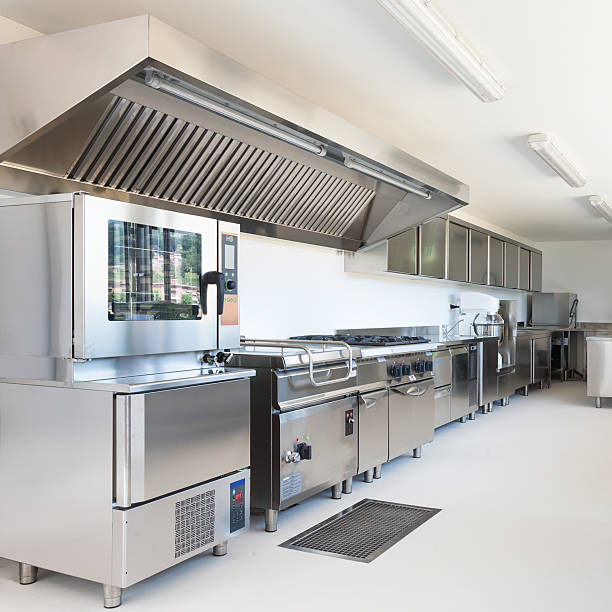The Canada Commercial Cooking Equipment (CCE) Market has experienced notable shifts in recent years, with energy efficiency and sustainability taking center stage. As environmental concerns continue to grow, energy-efficient CCE is becoming a key investment for commercial kitchens across the country. With the demand for eco-friendly solutions on the rise, these appliances not only help reduce operational costs but also contribute to meeting green building standards such as LEED (Leadership in Energy and Environmental Design) certifications. In this article, we explore how energy-efficient commercial cooking equipment is shaping the future of commercial kitchens in Canada and its alignment with sustainable building initiatives.
The Growing Demand for Energy-Efficient CCE
The Canadian CCE market is evolving rapidly, with energy efficiency emerging as a top priority for businesses. Commercial kitchens, which are typically high-energy consumers due to the constant operation of appliances like ovens, stoves, fryers, and refrigerators, are increasingly adopting energy-efficient models to reduce energy consumption, lower utility costs, and minimize their environmental footprint.
Several factors contribute to this shift in preference for energy-efficient equipment. First, commercial establishments, including restaurants, hotels, and catering services, are constantly looking for ways to reduce operating costs, and energy-efficient appliances offer long-term savings. These appliances use advanced technologies to consume less energy while maintaining high performance, making them a smart financial choice for businesses.
Second, the Canadian government is placing increasing emphasis on environmental sustainability. Energy-efficient CCE not only helps businesses meet environmental standards but also aligns with national initiatives aimed at reducing greenhouse gas emissions and promoting green practices. As Canada moves toward a more sustainable future, energy-efficient appliances are becoming a vital component in achieving these goals.
Energy-Efficient Appliances in Commercial Kitchens
Energy-efficient commercial cooking equipment includes a variety of appliances designed to minimize energy usage while delivering optimal cooking performance. Some of the key appliances contributing to energy savings in commercial kitchens include:
1. Energy-Efficient Ovens and Ranges: Traditional ovens and ranges often consume significant amounts of energy. However, newer models feature energy-saving technologies such as convection cooking, improved insulation, and precision temperature control to reduce energy consumption without sacrificing cooking quality. These ovens are designed to cook food faster and more evenly, thereby reducing cooking times and overall energy usage.
2. Induction Cooking Technology: Induction cooking technology is gaining popularity in commercial kitchens due to its high energy efficiency. Induction cooktops use electromagnetic fields to directly heat pots and pans, unlike traditional stovetops, which rely on heating elements. This method reduces heat loss and provides faster cooking times, ultimately saving energy and reducing operational costs.
3. Energy-Efficient Dishwashers: Dishwashers in commercial kitchens consume substantial amounts of water and energy. Energy-efficient dishwashers are designed to use less water and energy while providing the same level of cleanliness. They employ advanced technologies such as high-efficiency motors, low-water usage, and faster wash cycles to reduce energy consumption.
4. Energy-Efficient Refrigerators and Freezers: Commercial refrigeration systems, such as refrigerators and freezers, are essential in commercial kitchens. Energy-efficient models feature enhanced insulation, energy-saving compressors, and more efficient cooling systems to minimize electricity consumption. These units can help businesses save money while ensuring that food remains fresh and safe for consumption.
Energy-Efficient CCE and Green Building Standards
A significant trend in the Canadian CCE market is the alignment of energy-efficient appliances with green building standards, particularly LEED certification. LEED is a globally recognized certification system that promotes sustainable building practices and evaluates the environmental impact of buildings across various categories, including energy performance, water efficiency, and indoor environmental quality.
The incorporation of energy-efficient commercial cooking equipment plays a critical role in helping commercial kitchens achieve LEED certification. LEED-certified buildings must meet stringent criteria for energy consumption, and energy-efficient appliances contribute to meeting these requirements by reducing overall energy use and lowering carbon emissions.
The Benefits of Meeting Green Building Standards
For commercial kitchen operators in Canada, meeting green building standards by adopting energy-efficient CCE offers several significant benefits:
1. Lower Operating Costs: By investing in energy-efficient CCE, businesses can significantly reduce their energy consumption, leading to lower utility bills over time. As energy costs continue to rise, these savings can have a substantial impact on the overall profitability of a commercial kitchen.
2. Improved Sustainability and Environmental Impact: Energy-efficient appliances help reduce the environmental impact of commercial kitchens by minimizing energy consumption and lowering carbon emissions. This is particularly important in a time when sustainability is at the forefront of business operations, and consumers are increasingly looking for businesses that prioritize eco-friendly practices.
3. Enhanced Brand Image: Businesses that adopt energy-efficient technologies and meet green building standards can promote their commitment to sustainability. This can enhance their brand image, attracting eco-conscious customers who prioritize environmental responsibility. Being recognized as a green business can also improve customer loyalty and open doors to new business opportunities.
4. Compliance with Government Regulations and Incentives: The Canadian government offers various incentives and rebates for businesses that adopt energy-efficient technologies, including CCE. By investing in energy-efficient equipment, businesses can take advantage of these financial incentives, reducing the upfront cost of new appliances while contributing to the country’s environmental goals.
Challenges in Adopting Energy-Efficient CCE
While the adoption of energy-efficient commercial cooking equipment in Canada offers significant benefits, there are some challenges that businesses may face. One of the main barriers is the higher upfront cost of energy-efficient appliances compared to traditional models. Although these appliances save money in the long term, the initial investment can be a deterrent for some businesses.
Another challenge is the need for proper training and maintenance. Energy-efficient appliances often require specific operating procedures to function at their optimal efficiency. Without proper training and maintenance, businesses may not fully realize the energy-saving potential of these appliances.
Conclusion
The energy-efficient commercial cooking equipment (CCE) market in Canada is experiencing significant growth as businesses recognize the long-term financial and environmental benefits of adopting sustainable solutions. By investing in energy-efficient appliances, commercial kitchens can reduce energy consumption, lower operating costs, and contribute to meeting green building standards like LEED certification.





Comments